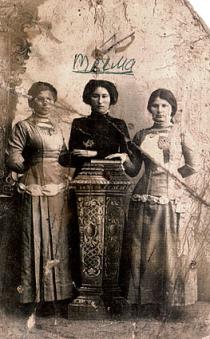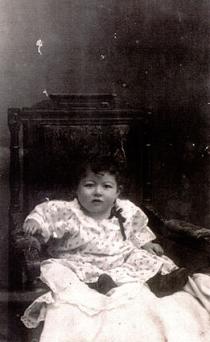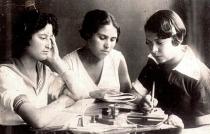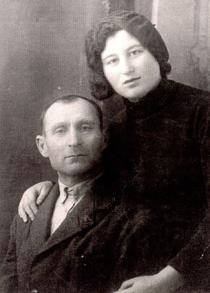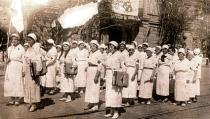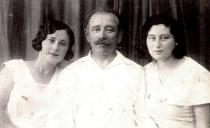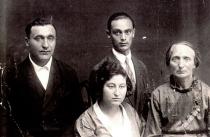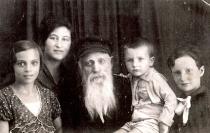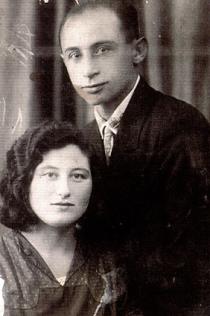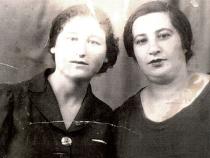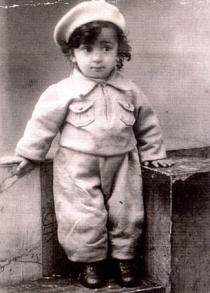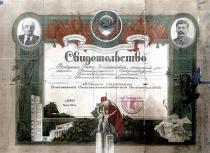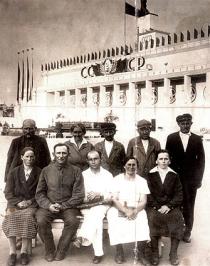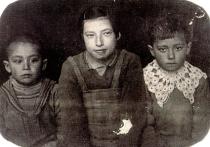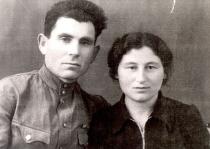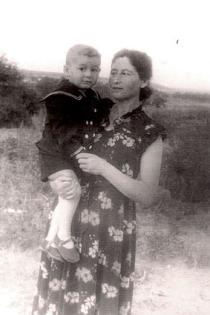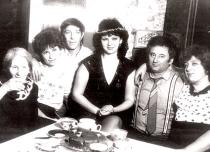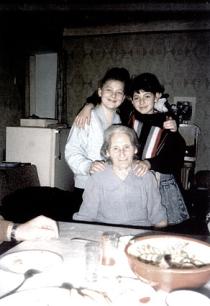In this photograph is my uncle Zalman Miller (in the center) photographed with me, Yelizaveta Zatkovetskaya, (I am from the right) and my friend Fira, an assistant doctor at the '17th district', when I was working my mandatory job assignment as a teacher after finishing college. This photograph was made, when my uncle visited me and met my husband to be Peretz Freidkin. This photo was made in 1936.
My mother's brother Zalman Miller, about 10 years older than my mother, lived in Ingulets. Zalman was married twice. His first wife Tsylia died leaving him with four children. He didn't have children with his second wife, and they were raising those four children. During the Great Patriotic War Zalman and his family were in evacuation somewhere in Siberia. He and then his wife Lubov died shortly after they returned from the evacuation.
There was a 4-year Jewish school in Sagaydak. I studied very well. My teachers thought I was the best in my class recommending my father that I continued my education. After finishing the 4th form in my school in 1928 a group of my classmates and I went to Israilevka, a Jewish colony near Sagaydak, to continue our education. There were twice as many residents and there was a 7-year Jewish school in the village.I studied in Israilevka for a year. When my uncle Zalman got to know that I lived in a hostel, he came to pick me up and take to his house in Ingulets colony, my mother's home town. My life in Zalman's house was very good. His wife Lubov treated his children like her own, and I was like their third daughter. I even envied my brothers and sisters for having never enjoyed so much warmth from my stepmother. My brothers Moishe and Israel had left their parents' home by then. I became lifelong friends with my sisters Yelizaveta and Riva. Uncle Zalman was a grain procurer. He traveled on business a lot and the family always looked forward to his return. Zalman wasn't a truly believing Jew. He had to work on Saturday. However, they celebrated holidays, symbolically, though: Pesach, Rosh Hashanah and Chanukkah. I studied in the 6th and 7th forms in Ingulets. I studied well and was a pioneer and an activist. I was usually responsible for helping pupils who were not so good with their studies. I liked it and decided to become a teacher.
In 1932 I finished 7-year school. Two of my friends also wanted to become teachers and convinced me to go to the Pedagogical College in Kiev. I was eager to see a big town, live and study in it. Besides, I had never seen a train before. Everything seemed interesting to me, and I was not afraid of anything. I became a student of the Jewish Faculty of Kiev Pedagogical College. This faculty trained teachers of the Jewish literature and language for Jewish schools. There were many Jewish schools in Ukraine at that time. We studied in Yiddish. I lived in a hostel. There were huge rooms. There were 16 tenants in my room. We got along well and had a lot of fun together. I also became a Komsomol member, when I was the first-year student and took an active part in public activities. Again I was responsible for helping other students with their studies. We were to study four years, but there was a need in teachers, and they reduced our course to three years. We celebrated all Soviet holidays, went to parades and festivals, but I also remembered the Jewish traditions. Being a Komsomol member, I couldn't openly celebrate holidays or go to the synagogue, but I tried to observe traditions quietly. I tried to do no hard work on Saturday and fasted on Yom Kippur without mentioning it to anyone. Of course, following the kashrut was out of the question since we were always hungry and ate whatever we could get.

